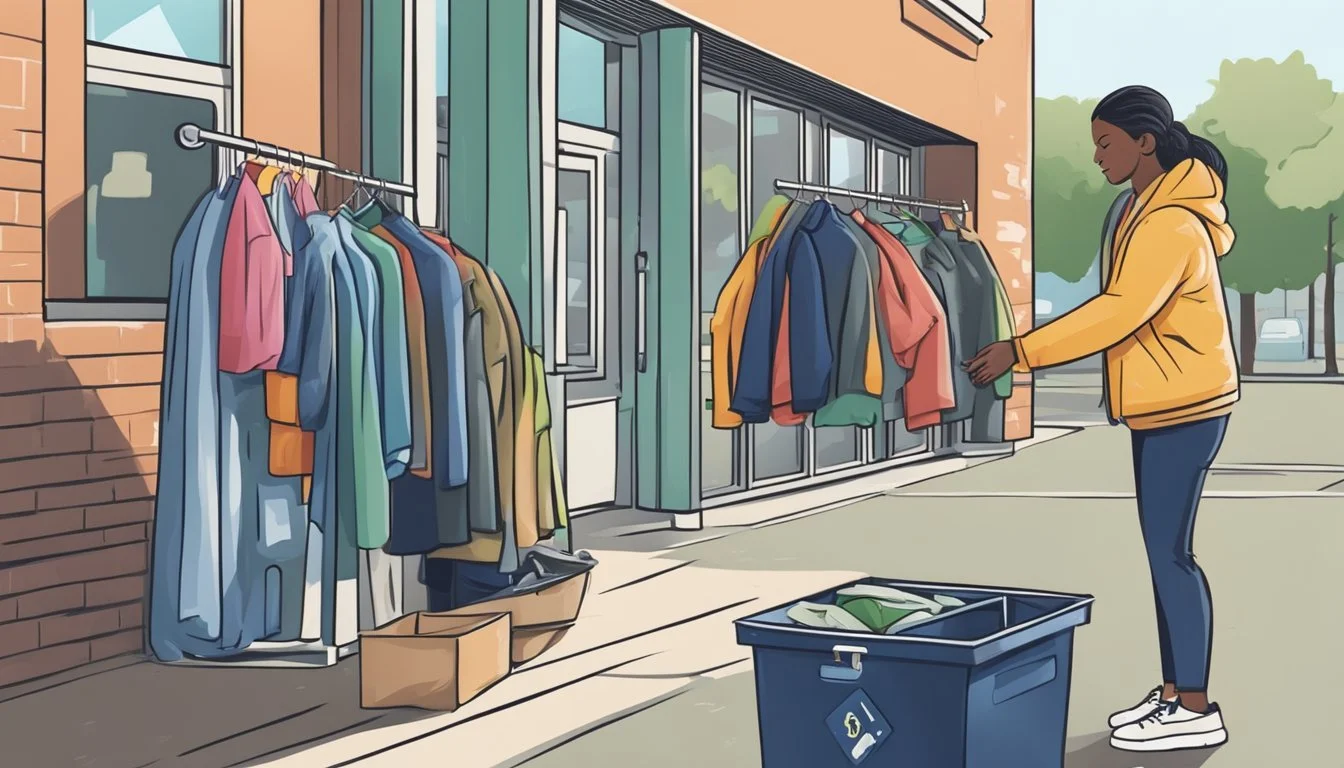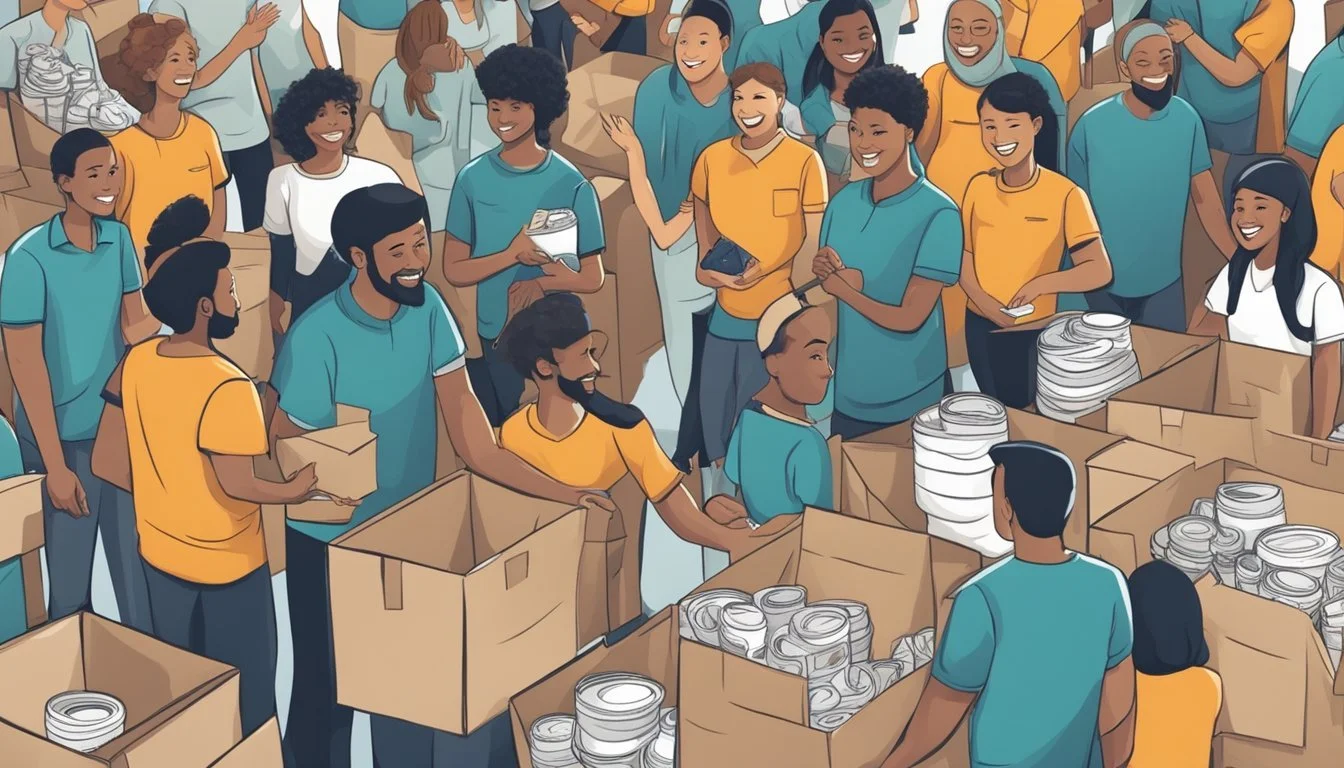14 Small Acts of Kindness That Can Make a Big Difference
Simple Ways to Brighten Someone's Day
Kindness has the power to transform lives and create positive change in the world. From a simple smile to a thoughtful gesture, small acts of compassion can ripple outward, touching hearts and inspiring others to pay it forward.
These modest deeds of goodwill often require minimal effort yet yield significant impact on both the giver and receiver. By incorporating acts of kindness into our daily routines, we can cultivate a more empathetic society and enhance our own well-being in the process. This article explores 14 accessible ways to spread kindness and make a meaningful difference in the lives of those around us.
1) Leaving a kind note
A simple handwritten note can brighten someone's day in unexpected ways. Whether left on a coworker's desk, slipped into a loved one's lunchbox, or tucked under a neighbor's windshield wiper, a thoughtful message shows care and consideration.
The note doesn't need to be long or elaborate. A few sincere words of appreciation, encouragement, or support can make a lasting impact. Something as simple as "You're doing a great job!" or "Thanks for being you" can lift spirits and foster connection.
Leaving anonymous notes of kindness in public spaces can spread positivity to strangers. A motivational message on a library book slip or an uplifting Post-it on a bathroom mirror might be just what someone needs to hear.
The act of writing and leaving a note also benefits the giver. Taking time to express gratitude and kindness can improve mood and outlook. It's a small gesture that creates a ripple effect of positivity for both the writer and recipient.
2) Holding the door open
Holding the door open for others is a simple yet powerful act of kindness. This small gesture can brighten someone's day and make them feel valued and respected.
It takes only a few seconds to hold a door, but the impact can be significant. For people carrying heavy items or those with mobility challenges, this act can provide much-needed assistance.
The courtesy of holding a door extends beyond physical help. It fosters a sense of community and consideration for others. This act can create a positive ripple effect, inspiring recipients to pay it forward.
In busy environments like offices or shopping centers, holding the door can ease the flow of foot traffic. It promotes smoother transitions between spaces and reduces potential stress or frustration.
This gesture is universally appreciated across cultures. It demonstrates awareness of others and a willingness to take a moment out of one's day to be considerate.
By holding doors open, individuals contribute to a more polite and friendly society. This small act serves as a reminder of the importance of kindness in daily interactions.
3) Complimenting a stranger
Offering a genuine compliment to a stranger can brighten their day in unexpected ways. This simple act of kindness requires little effort but can have a significant positive impact.
Compliments can boost self-esteem, create a sense of connection, and spread positivity. They may inspire the recipient to pass on the kindness to others, creating a ripple effect of goodwill.
When complimenting a stranger, focus on specific, sincere observations. This could be admiring someone's stylish outfit, their helpful behavior, or their warm smile.
It's important to be respectful and mindful of boundaries when approaching strangers. A brief, polite compliment delivered with a smile is often most effective.
Remember that not everyone may be comfortable receiving compliments from strangers. If someone seems uneasy, it's best to simply move on without pressing the issue.
By making a habit of complimenting strangers, individuals can contribute to a more positive and connected community. This small act of kindness has the potential to transform someone's mood and outlook.
4) Buying a meal for someone in need
Purchasing a meal for someone experiencing hunger or financial hardship can have a profound impact. This act of kindness provides immediate nourishment and relief to those struggling to meet their basic needs.
It can be as simple as buying an extra sandwich or coffee for a homeless person on the street. Some people choose to pay for the meal of the person behind them in a drive-thru line or restaurant queue.
Food banks and soup kitchens often welcome donations of prepared meals or groceries. These contributions help feed many individuals and families facing food insecurity in local communities.
Buying a meal for someone in need not only addresses immediate hunger but also offers a moment of human connection and dignity. It shows the recipient that someone cares about their wellbeing.
This small gesture can inspire hope and potentially motivate others to perform similar acts of kindness. The ripple effect of such actions can create a more compassionate society.
5) Donating unwanted clothes
Donating unwanted clothes is a simple yet impactful act of kindness. Many people have garments in their closets that they no longer wear or need. Instead of letting these items gather dust, donating them can make a significant difference in someone else's life.
Local charities, shelters, and thrift stores often accept clothing donations. These organizations distribute the clothes to individuals and families in need. Some even use the proceeds from selling donated items to fund community programs.
Clothing donations can help people who are struggling financially, job seekers in need of professional attire, or those recovering from natural disasters. It's an environmentally friendly option as well, reducing textile waste in landfills.
Before donating, ensure the clothes are clean and in good condition. Sort items by category to make it easier for organizations to process. Some places accept gently used shoes and accessories too.
Consider seasonal needs when donating. Winter coats and warm clothing are particularly valuable during colder months. Likewise, professional attire can be crucial for those entering the workforce.
6) Volunteering at a local charity
Volunteering at a local charity is a powerful way to make a positive impact in your community. By giving your time and skills, you can support causes that matter to you and help those in need.
Many charities rely on volunteers to carry out their important work. Whether it's serving meals at a soup kitchen, sorting donations at a food bank, or helping at an animal shelter, your efforts can make a real difference.
Volunteering provides opportunities to learn new skills and meet like-minded people. It can be a rewarding experience that broadens your perspective and builds empathy for others.
Even a few hours a month can contribute significantly to a charity's mission. Many organizations offer flexible schedules to accommodate volunteers' availability.
By volunteering, you set an example for others and inspire them to get involved. Your actions can create a ripple effect, encouraging more people to give back to their communities.
7) Sending a thank you card
Sending a thank you card is a simple yet powerful act of kindness. It shows appreciation for someone's actions, gifts, or presence in one's life. A handwritten card carries a personal touch that digital messages often lack.
The act of writing and sending a card demonstrates thoughtfulness and effort. It lets the recipient know they are valued and their kindness has been noticed. This small gesture can brighten someone's day and strengthen relationships.
Thank you cards are versatile and suitable for various occasions. They can express gratitude for a gift, acknowledge help received, or simply appreciate someone's friendship. The card doesn't need to be elaborate; a few sincere words can make a significant impact.
Sending thank you cards regularly can foster a culture of gratitude. It encourages people to recognize and appreciate the kindness of others. This practice can lead to more positive interactions and a greater sense of community.
8) Helping someone carry groceries
Offering to help carry groceries is a simple yet impactful act of kindness. This gesture can be especially meaningful for those who may struggle with heavy bags, such as elderly individuals or parents with young children.
By assisting with grocery carrying, you can alleviate physical strain and make someone's day a little easier. This act not only helps the recipient but also creates a sense of community and connection between neighbors or strangers.
The offer to help can be made in various settings, such as apartment buildings, parking lots, or on the street. It's important to approach the person respectfully and ask if they would like assistance before taking action.
This small act of kindness can have a ripple effect, inspiring others to be more considerate and helpful in their daily lives. It demonstrates that even brief interactions can make a positive difference in someone's day.
Helping with groceries is a practical way to show support and care for others in your community. It's a simple gesture that requires minimal effort but can significantly impact the recipient's mood and overall well-being.
9) Sharing positive feedback
Expressing appreciation for others' efforts can significantly brighten their day. A sincere compliment or words of encouragement can boost confidence and motivation. This small act of kindness costs nothing but can have a lasting impact.
Sharing positive feedback at work can improve team morale and productivity. Recognizing a colleague's hard work or innovative ideas fosters a supportive environment. It also strengthens professional relationships and encourages continued excellence.
In personal relationships, acknowledging someone's positive qualities or actions strengthens bonds. Telling a friend how much their support means or praising a family member's accomplishments shows care and attention. These gestures often lead to reciprocal kindness.
Social media platforms provide opportunities to share positive feedback on a broader scale. Leaving an encouraging comment on someone's post or sending a supportive message can uplift spirits. This digital kindness can reach people far and wide, potentially inspiring others to do the same.
10) Smiling at someone who looks sad
A simple smile can brighten someone's day, especially when they appear to be feeling down. This small gesture costs nothing but can have a profound impact on both the giver and receiver.
Smiling at a stranger who seems sad acknowledges their presence and offers a moment of human connection. It conveys empathy and support without the need for words.
This act of kindness can help lift the recipient's mood, even if only temporarily. A smile releases endorphins, which can reduce stress and promote feelings of happiness.
For the person smiling, this action cultivates compassion and awareness of others' emotions. It encourages a habit of looking for opportunities to spread positivity in daily life.
While a smile alone may not solve complex problems, it can provide a brief respite from negative emotions. This small kindness reminds others they are not alone and that people care.
11) Offering your seat to someone who needs it
Public transportation can be crowded and uncomfortable, especially for those with physical limitations. Offering your seat to someone who needs it more is a simple yet impactful act of kindness.
This gesture particularly benefits elderly individuals, pregnant women, people with disabilities, or those carrying heavy items. It shows consideration for others and promotes a sense of community.
By giving up your seat, you ease someone else's journey and potentially prevent accidents or discomfort. This small act can significantly improve their day and set a positive example for others around you.
Remember that not all disabilities are visible. Some people may appear able-bodied but still require a seat due to hidden conditions. Being observant and willing to offer your seat can make a real difference.
This act of kindness extends beyond public transportation. It applies to waiting rooms, crowded events, or any situation where seating is limited. By being aware of others' needs, you contribute to a more compassionate society.
12) Donating blood
Donating blood is a powerful act of kindness that can save lives. A single donation can help multiple patients, including those undergoing surgeries, accident victims, and individuals with chronic illnesses.
The process is simple and typically takes less than an hour. Donors are screened for eligibility, and the actual blood draw usually lasts only 10-15 minutes.
Blood banks and hospitals constantly need donors to maintain adequate supplies. Regular donations help ensure that blood is available when emergencies arise.
Many people are eligible to donate, though there are some health and travel restrictions. Donors must be in good health, meet age and weight requirements, and pass a brief medical screening.
Donating blood has minimal side effects for most people. Donors often receive a snack and drink afterward to help replenish fluids and nutrients.
Some donation centers offer additional ways to help, such as platelet or plasma donation. These components are crucial for treating specific medical conditions.
By donating blood, individuals can make a tangible difference in their community. It's a selfless act that directly contributes to saving and improving lives.
13) Visiting a nursing home
Visiting a nursing home can brighten the day of elderly residents who may feel isolated or lonely. Many seniors in these facilities receive few or no visitors, making social interactions particularly meaningful.
Spending time with nursing home residents offers companionship and stimulation. Visitors can engage in conversation, play games, or simply sit and listen to the seniors' stories and experiences.
Reading aloud to residents or helping them write letters to loved ones are thoughtful activities that foster connection. Some visitors bring small gifts like flowers, books, or homemade treats to share.
Volunteering at nursing homes often involves participating in group activities or assisting with meals. These contributions help create a more vibrant and engaging environment for the residents.
Regular visits can have a profound impact on seniors' well-being, boosting their mood and cognitive function. Even short, periodic visits can make a significant difference in their quality of life.
Before visiting, it's important to check the facility's policies and any health and safety guidelines. Respecting residents' privacy and autonomy is crucial when spending time in their living space.
14) Picking up litter in your community
Picking up litter is a simple yet impactful act of kindness that can transform neighborhoods. By taking a few moments to collect and dispose of trash properly, individuals contribute to a cleaner, more attractive environment for everyone.
This small gesture has far-reaching benefits. It helps prevent pollution, protects wildlife, and improves the overall aesthetics of public spaces. Clean communities often experience increased property values and improved quality of life for residents.
Engaging in litter cleanup also sets a positive example for others. When people see someone picking up trash, they may be inspired to do the same or become more conscious about proper waste disposal.
Communities can organize group cleanup events to make a bigger impact. These gatherings foster a sense of unity and shared responsibility among neighbors. They also provide an opportunity for people to meet and connect while working towards a common goal.
Picking up litter is an accessible way for anyone to make a difference. It requires no special skills or equipment, just a willingness to take action. Even collecting a few pieces of trash during a daily walk can contribute to a cleaner community over time.
The Science Behind Kindness
Acts of kindness trigger measurable changes in our brains and bodies. These changes impact both the giver and recipient on psychological and social levels.
Psychological Benefits
Kindness releases feel-good chemicals in the brain. Dopamine, serotonin, and oxytocin increase when we perform or receive kind acts. This boost in neurotransmitters can improve mood and reduce stress.
Studies show that regular acts of kindness can lower anxiety and depression. They also enhance overall life satisfaction and self-esteem. Kindness activates the vagus nerve, which is linked to positive emotions and social connection.
Practicing kindness can increase empathy and compassion. It helps shift focus away from our own problems, providing perspective. This cognitive reframing can lead to greater resilience and emotional well-being.
Social Impacts
Kind acts strengthen social bonds and foster trust. They create a ripple effect, inspiring others to pay it forward. This can lead to more cohesive communities and improved social support networks.
Kindness in the workplace boosts morale and productivity. It enhances team cooperation and reduces conflict. Schools that promote kindness see decreased bullying and improved academic performance.
Acts of kindness can bridge divides between different groups. They promote understanding and reduce prejudice. In healthcare settings, kindness from providers improves patient outcomes and satisfaction.
Kindness also benefits relationships. It increases feelings of connection and intimacy between partners. Families who practice kindness report higher levels of harmony and emotional closeness.
Incorporating Kindness into Daily Life
Integrating acts of kindness into everyday routines creates a positive ripple effect. Simple practices and intentional habits can transform ordinary moments into opportunities for compassion and connection.
Mindfulness Practices
Start each day with a kindness intention. Take a few deep breaths and visualize spreading positivity to others. This mental preparation sets a compassionate tone for the day ahead.
Practice active listening in conversations. Give full attention, maintain eye contact, and respond thoughtfully. This shows respect and genuine interest in others' perspectives.
Cultivate gratitude by noticing three kind acts or gestures each day. Acknowledge both receiving and giving kindness to reinforce its importance.
Use technology mindfully to spread kindness. Send encouraging text messages or leave positive comments on social media posts. These small digital actions can brighten someone's day.
Building a Kindness Routine
Incorporate random acts of kindness into daily activities. Hold doors open, offer sincere compliments, or let someone ahead in line at the grocery store.
Create a kindness calendar with specific actions for each day. Examples include:
Monday: Leave a thank-you note for a coworker
Tuesday: Donate unused items to charity
Wednesday: Call a friend or family member to check in
Volunteer regularly for local organizations. Commit to a set schedule, such as monthly shifts at a food bank or weekly visits to an animal shelter.
Make kindness visible. Keep spare umbrellas in the car to offer during rainy days or carry extra snacks to share with homeless individuals encountered on daily commutes.
Community and Global Impact of Kindness
Small acts of kindness can ripple outward, transforming communities and even influencing global dynamics. These actions foster connection, empathy, and social cohesion.
Enhancing Community Bonds
Acts of kindness strengthen the fabric of communities. Neighbors helping neighbors creates a sense of belonging and mutual support. Simple gestures like shoveling snow from an elderly person's driveway or organizing a neighborhood cleanup build trust and cooperation.
Community kindness initiatives, such as "pay it forward" campaigns or volunteer days, inspire collective action. These efforts often lead to decreased crime rates and increased civic engagement.
Local businesses participating in kindness programs see improved customer loyalty and positive word-of-mouth. Schools implementing kindness curricula report reduced bullying incidents and improved academic performance.
Kindness in the Workplace
Kindness in professional settings boosts morale, productivity, and employee retention. Companies fostering a culture of kindness experience lower absenteeism and higher job satisfaction.
Simple acts like offering to help a coworker with a project or recognizing team members' efforts can transform workplace dynamics. Kind leadership practices, such as actively listening to employees and providing constructive feedback, lead to increased innovation and collaboration.
Workplace kindness initiatives, like mentorship programs or volunteer days, strengthen team bonds and improve company reputation. This positive environment often translates to better customer service and increased profitability.











